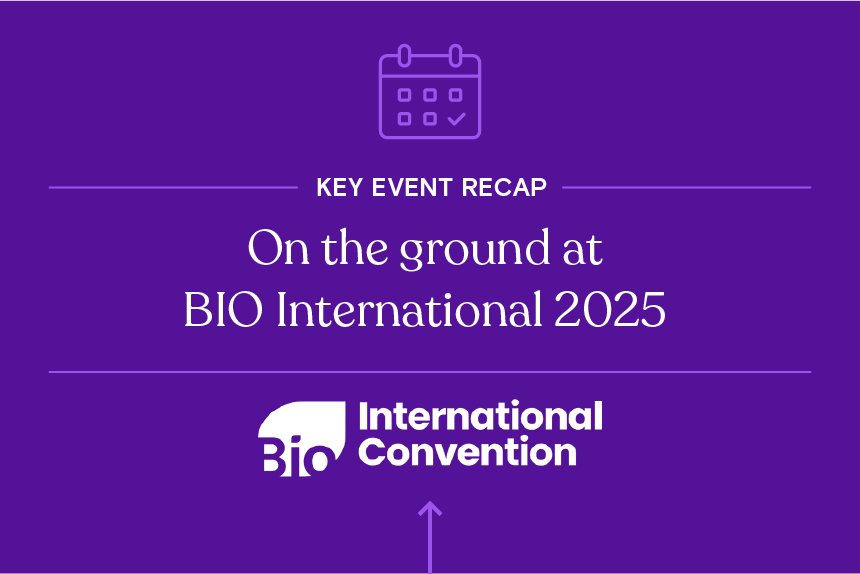The mood at the BIO International Convention reflected a moment of transition for biotech. Policy shifts and tighter financial conditions that have been building since the start of the year are starting to influence strategic decisions. But after talking with colleagues, investors, and researchers all week, one thing was clear: confidence in the science and in the industry's ability to evolve remains strong. That balance of risk and resilience came through across the entire program. From a neuroscience-led push to transform psychiatry to a long-overdue reckoning in women’s health, here are a few themes and sessions that sparked debate, reflection, and optimism about what’s next.
Precision psychiatry is (almost) here, and it’s personal
Innovation continues to push biotech forward, and nowhere was that more clear than in a session on precision psychiatry. After decades dominated by trial-and-error treatment, psychiatry is stepping into the era of precision medicine. Once seen as out of reach for mental health, data-driven approaches, ranging from genetic testing to brainwave analysis, are now being tested as tools to personalize psychiatric care.
The session unpacked how these technologies are beginning to shift neuropsychiatry, raising both hope and hard questions about what works, for whom, and at what scale. Panelists stressed that psychiatric disorders like major depressive disorder (MDD) are not just behavioral, they’re biological. Yet more than half of U.S. patients with MDD remain untreated, often due to prior treatment failures or side effects.
New technologies are pushing the field forward. For example, pharmacogenomic tests that detect variations in drug-metabolizing enzymes, like those in the CYP450 enzyme family, can offer clues about how a patient might respond to certain antidepressants, helping guide medication choices.
Electroencephalograms (EEGs), traditionally used in epilepsy and sleep studies, are now being studied as tools to detect brain-based biomarkers of mood disorders. Meanwhile, machine learning algorithms trained on massive datasets, from brain scans to patient histories, aim to forecast treatment response with greater precision.
While promising, these models are still a work in progress. Unlike cancer or heart disease, psychiatric illnesses can’t be pinned to a single gene or pathway. Disorders like depression or schizophrenia arise from a complex mix of brain biology, life experience, and environment—factors that don’t fit neatly into a lab test. This complexity has slowed psychiatry’s progress in developing targeted biological treatments, compared to fields like oncology.
But with growing investment, better data, and deeper biological insight, psychiatry is inching closer to treatments that reflect the complexity of the brain, and the individuality of each patient.
Rethinking how we define, research, and invest in women’s health
Panelists from Organon, Women’s Health Access Matters (WHAM), and the Society for Women’s Health Research urged the audience to confront deep-rooted biases in how women’s healthcare is researched, funded, and delivered, calling for a fundamental shift in investment, research design, and policy driven by cross-sector collaboration.
Historically, women’s health has been narrowly defined, deeply underfunded, and largely limited to reproductive care. It wasn’t until 1993 (yes, just three decades ago) that the NIH Revitalization Act even mandated the inclusion of women and minorities in clinical research.
As the panelists made clear, this isn’t just an issue of representation; it’s one of efficacy. Many conditions that disproportionately affect women, such as autoimmune disorders, are still diagnosed and treated using frameworks based on male-dominated data, often leading to misdiagnoses and suboptimal outcomes.
“When we say women’s health, we don’t mean niche. We mean half the population,” a panelist emphasized.
Research shows that investing in women’s health pays dividends across the board: better clinical outcomes, reduced system costs, and increased workforce participation. In other words, what’s at stake isn’t just fairness. Improving health for half the population benefits the whole system—medically, economically, and socially.
Panelists called for the integration of sex-based differences into every stage of research and drug development, from preclinical studies to clinical trials, to ensure treatments are safe and effective for everyone.
Finally, they highlighted the importance of rebalancing both public and private funding to close the persistent innovation gap in women’s health and accelerate progress across a wider spectrum of conditions that impact women’s lives.
This session was a call to action urging industry leaders, regulators, and funders to invest in solutions that serve everyone, not just the historic default. After all, women do reproduce the entire human population. Investing in women’s health means investing in the health of future generations.
U.S. policy uncertainty is a strategic challenge for biotech
While conversations around precision psychiatry and women’s health sparked excitement at BIO International 2025, the most talked-about topic was the growing impact of shifting U.S. policy, with many industry leaders indicating policy changes are starting to impact business decisions, from hiring to global expansion plans.
The factors are wide-ranging: decreasing federal support, rising supply chain costs, and the perception of increasing political influence over regulatory agencies like the FDA. Some companies said they are considering whether to scale back their U.S. operations or relocate operations abroad, both to tap into other sources of capital and to operate in more predictable environments.
Industry leaders also noted efforts to attract U.S.-based researchers to institutions in Canada, Europe, the U.K., as terminated grants have reduced certain opportunities domestically. Additionally, changes in federal grant-making, including heightened scrutiny and, in some cases, the termination of clinical research funding linked to international collaborations, have added new layers of complexity for commercial research programs involved in global partnerships.
Another consideration: the impact on contract research organizations (CROs) that have offshored capacity outside the U.S. Biotech observers sense that NIH Small Business Innovation Research (SBIR) grant proposals may face difficulties if contract work is performed outside the U.S., including in E.U. sites. This is prompting some to prioritize U.S.-based CROs.
Finally, changes in regulatory processes were a recurring theme. From debate around the ACIP vaccine agenda to delays at the FDA, companies are preparing for potential disruptions to key milestones, product launches, and regulatory timelines.
The broader takeaway from the conference? If these trends continue, the U.S. may risk its long-standing leadership in biotech innovation, not because the science is stronger elsewhere, but because the system here is becoming harder to navigate. But many at BIO 2025 also agreed: for now, the U.S. still has the talent, infrastructure, and scientific chops to remain a biotech powerhouse—if policymakers keep the system aligned with the science.
Spot opportunities driving biotech growth
With the right data and analytics, you can monitor the healthcare landscape and anticipate emerging trends that impact biotech and biopharma. Definitive Healthcare gives you the tools to build data-driven strategies, so you can find opportunities amid the disruptions, forecast potential shifts in demand (and allocate resources accordingly), and gain a competitive advantage in a dynamic market. Start a free trial today.





